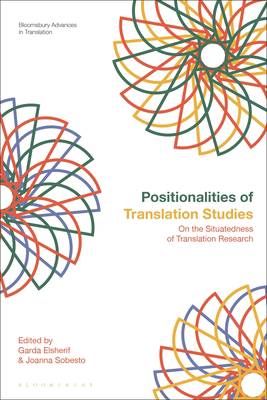
- Retrait gratuit dans votre magasin Club
- 7.000.000 titres dans notre catalogue
- Payer en toute sécurité
- Toujours un magasin près de chez vous
- Retrait gratuit dans votre magasin Club
- 7.000.0000 titres dans notre catalogue
- Payer en toute sécurité
- Toujours un magasin près de chez vous
Positionalities of Translation Studies
On the Situatedness of Translation Research
145,45 €
+ 290 points
Description
This volume explores historical, cultural, linguistic, and anthropocentric influences on Translation Studies (TS).
It brings together nuanced, individual, self-reflexive case studies and juxtaposes them in order to provoke discussion on the role of contemporary researchers in the discipline of TS. As well as reflecting on the historical and geographical dimensions of the situatedness of TS, the book builds on existing reflections on the local, political and linguistic positions of TS and examines the practical and methodological consequences of these discussions. By considering insights and perspectives from various disciplines, the contributors refer to the current state of the art in TS and reconstruct the discussions held on Eurocentrism, anthropocentrism and the historicity of TS that have been discussed in isolation so far. This volume maps potential relations between them and introduces an analytical concept of positionality that highlights commonalities among various discourses. As well as theoretical and historical analysis, the contributors ask how to methodologically deal with this inevitable positioning of research in contemporary research practice. The contributions cover various aspects of positionalities and its influences on translation research, including gender, anthropocentrism, experiential knowledge and geopolitics. They also explore various histories of translation studies, in different temporal, spatial and linguistic settings, such as China/Chinese, Iran/Persian, the Netherlands/English, Ukraine/Ukrainian/Russian and France/French, thereby highlighting that TS as a discipline is not a monolith but consists of various histories interconnected with each other.Spécifications
Parties prenantes
- Editeur:
Contenu
- Nombre de pages :
- 272
- Langue:
- Anglais
- Collection :
Caractéristiques
- EAN:
- 9781350447868
- Date de parution :
- 12-06-25
- Format:
- Livre relié
- Format numérique:
- Genaaid
- Dimensions :
- 156 mm x 234 mm
- Poids :
- 453 g

Les avis
Nous publions uniquement les avis qui respectent les conditions requises. Consultez nos conditions pour les avis.





